
High-tech for hemp [from Canadian Packaging October 2012 issue]
By Andrew Joseph, Features Editor
General Allegro Industries Eagle Product Inspection Festo hemp Manitoba Harvest Hemp Foods Pack 320 X-Ray Plan Automation SteelNor Systems Techno Pak Wexxar Packaging X-Ray equipmentNew X-Ray product inspection system boosts production line efficiency and product quality control assurance for leading vertically-integrated hemp food manufacturer.
Just the mere mention of the word ‘hemp’ can sometimes be enough to conjure up images of the notorious and highly controversial marijuana drug plants, with all the negative connotations and other baggage that this highly misunderstood common weed has acquired over the ages.
But despite being related to the infamous cannabis plant family, 90 per cent of the estimated 2,000 know hemp plant varieties contain virtually negligible amounts of the illicit psychoactive THC (tetrahydrocannabinol) responsible for producing the pot “high” that has given the plant its shady, if highly questionable, reputation as a gateway drug to more serious substance addictions.
The truth is that the lion’s share of hemp plants can be processed to make a wide range of useful products, including products with well-proven and tested health benefits.
“What people don’t realize is that hemp, along with offering a healthy food, can also be used effectively in the manufacture of many environmentally-friendly products such as paper, textiles, biocomposites and sustainable building materials,” points out Tom Greaves, director of operations with Manitoba Harvest Hemp Foods.
Located at a 20,000-square-foot production facility in Winnipeg, the 85-employee company produces a surprisingly broad range of popular hemp-based products, including the Hemp Hearts brand of raw shelled hemp seeds, protein powders, hemp oil and the Hemp Bliss brand of beverages, along with doing some private-label work for other customers.
According to Greaves, the hemp processed by his company offers average everyday consumers a plethora of healthy benefits—especially for those people looking to add essential omegas and plant-based easy-to-digest protein into their daily diet.
“The best part of our products, especially Hemp Hearts, is that they taste great,” Greaves told Canadian Packaging in a recent interview, adding that Manitoba Harvest products can be found at most health-food stores across Canada and the U.S., as well as in the aisles of leading grocery retailers such as Whole Foods, Loblaws, Safeway and Costco.
Better Choice
“We offer a choice of Certified Organic and Natural,” he states, “and they are Kosher-certified made at our state-of-the-art facility.”
Containing 10 essential amino acids, edible hemp offers a rich and balanced source of Omega-3, Omega-6 and the rare GLA (gamma linolenic acid) fatty acids that provide a natural means for controlling cholesterol levels and blood pressure levels, Greaves explains, citing proven benefits of healthy heart maintenance and hormonal balance.
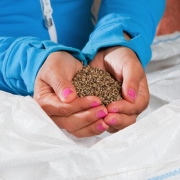
Tasty, edible hulled hemp seeds are claimed to provide a multitude of health benefits to the consumers.
The tasty and easily-digested hemp seeds are also packed with other important nutrients such as chlorophyll, vitamins E and B and phosphorus, potassium, magnesium and calcium—all key for effective energy metabolism, and protein and bone synthesis—as well as folic acid, which is an important ingredient for women trying to become pregnant.
While Manitoba Harvest has been at the forefront of Canada’s hemp growing and processing industry since it began operation in 1998, the company’s roots trace back to the early 1990s, when company co-founders Mike Fata, Martin Moravcik and Alex Chwaiewsky helped legalize hemp, working with farmers and academics from the early 1990s.
The eventual legalization of hemp farming by 1998 finally resulted in Manitoba Harvest opening up shop and begin producing high-quality hemp food products in relatively small quantities at first, while getting actively involved in educating the public on the many misconceptions of the hemp seeds and providing information of its numerous health benefits.
“We started out small—initially selling fresh hemp oil and shelled hemp seeds at local farmer’s markets and to local retailers,” Greaves relates.
“But thanks to grass roots marketing, we had grown to the point that by 2001 we were preparing our first shipment of hemp to the U.S.”
Unfortunately the United States Drug Enforcement Agency (DEA) had other ideas at the time—actively campaigning to make the sale of all hemp foods illegal in the U.S.
Legal Spat
However, after a drawn-out, three-year legal battle spearheaded by the not-for-profit Hemp Industries Association, fledgling hemp producers such as Manitoba Harvest finally got their wish.
“It was a long three years, and the ban regarding the sale of hemp foods in the U.S. was a major hurdle for Manitoba Harvest,” says Greaves, “but although it slowed us down, it did not deter our growth.”
In fact, Manitoba Harvest today ranks as the largest vertically-integrated hemp-foods manufacturer in the world, according to Greaves.
“We control every aspect of the production process—from sourcing crops, to food processing, packaging and distribution,” reveals Greaves.
“And we hold ourselves to the highest operational standards.”
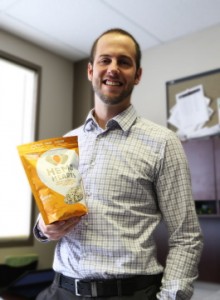
Director of operations Tom Greaves holds up a bag of Manitoba Harvest Hemp Hearts edible hemp seeds.
To ensure a reliable product supply, Manitoba Harvest partners directly with hemp farmers to source the raw, non-genetically modified hemp seed.
“The pre-screened farmers deliver their product directly to our facility, which creates a closed-loop sourcing system,” he explains.
“We take the raw hemp seeds and other natural, organic and fair-trade ingredients, do quality-control testing, and only then process them to produce our various products fresh in-house at our kosher and organic-certified facility.”
According to Greaves, the plant undergoes a series of voluntary certifications and procedural standards audits each year to maintain its hard-earned reputation for high product quality and safety.
Peace of Mind
“It’s simply a peace-of-mind effort for us and our consumers to know that you can trust exactly where your food is coming from,” he explains, pointing out the company is in the process of becoming the world’s first hemp food producer to achieve the prestigious BRC (British Retail Consortium) food safety certification, along with also being HACCP (Hazard Analysis and Critical Control Points)-certified and boasting regularly updated GMP (Good Manufacturing Practices) validation.
Operating a 24-hours-day, five-days-a-week schedule to run the plant’s two production and two packaging lines, the company is nowadays reaping the rewards of all its early hard work in a big way, says Greaves, citing 50 percent annual business growth over the last five years and aiming for a 100-percent sales increase for this year, compared to 2011.
“In fact, we do not expect to see our growth to slow down any time soon,” he reasons, “with our increasingly more health-conscious society really looking for new healthy food products that also tastes great.”
Says Greaves: “There are many reasons for our success, including marketing, sales and the product teams, but a large part of it is really due to our vertical integration, which provides us with the ability to provide a diverse range of very high quality products into the marketplace.”
Built for Speed
To maintain those high-quality standards well into the future, the company recently installed a highly advanced, state-of-the-art Pack 320 model X-Ray product inspection system—manufactured by Eagle Product Inspection of Tampa, Fla.—to perform full top-to-bottom inspection of hemp seeds packaged on the plant’s existing, semi-automated filling equipment.
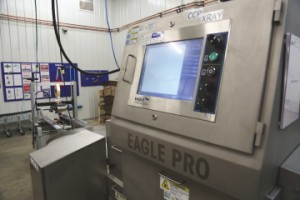
Purchased via packaging systems supplier and integrator Plan Automation, the model Pack 320 X-Ray system from Eagle Product Inspection provides Manitoba Harvest with a critical layer of quality control assurance.
Designed for high-speed flowwrap lines handling small- to mid-sized packaged items, the high-speed Pack 320 X-Ray system uses its powerful detection capabilities to examine items at speeds up to 1,200 units per minute, with 320-mm (12-inch) detector coverage, employing a high-precision push-arm rejection system with Festo pneumatic components to instantly eject contaminant-positive packs from the line.
“We wanted to install the Pack 320 X-Ray equipment to ensure customers that we are providing the highest quality hemp food product possible into the marketplace,” states Greaves, complimenting packaging systems supplier and integrator Plan Automation of Orangeville, Ont., for the successful system installation and startup this past August.
“Right from the initial contact, Plan Automation was very professional and easy to work with,” mentions Greaves. “Not only do they possess a very high level of customer service which showed through during the project, but their staff was very knowledgeable, which allowed for a smooth implementation and startup of our new equipment.”
As Plan Automation’s X-Ray inspection specialist Mat Bédard recalls: “Although Manitoba Harvest initially said they only required an X-Ray system, after going to their plant to see their operation, we were able to offer them further advice on how we could improve the overall flow of their productions lines.
“To help them reorganize the packaging room,” Bédard relates, “we designed the floor layout, uncrated the new equipment, positioned it and leveled it with other equipment, and provided fuller integration between conveyors and components, making sure the whole line ran to Manitoba Harvest’s specifications.
“It turned out that Manitoba Harvest was actually interested in a full turnkey solution,” says Bédard, adding Plan Automation also supplied the Manitoba Harvest plant with a Wexxar-Bel accumulation table, along with three conveyors from Allegro Industries with full washdown capabilities and constructed to meet all the required AMI (American Meat Institute) standards, to round out the entire project.
“Having completed the redesign of our packaging room to accommodate the new X-Ray equipment in the summer, we are now currently working on some significant upgrades throughout the remaining parts of our facility that will take place in the next few months,” says Greaves, citing much improved line performance and efficiencies in the upgraded packaging room.
Other important pieces of key packaging equipment installed at the Winnipeg plant before last summer include two Wexxar-Bel WFPS 5150 semi-automatic form/pack/seal combination units that actually combine the features of the model BEL 505 semi-automatic case former and pack station with the model BEL 150 pressure-sensitive case taper in one high-performance, compact-design system.
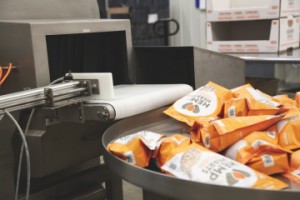
Passing the Festo pneumatic reject system positioned after the Eagle model 320 X-Ray system, bags of hemp product revolve on a Wexxar-Bel accumulation table before case-packed.
Purchased via Techno Pak of Sainte-Julie, Que., the hard-working WFPS 5150 systems are ergonomically-designed to enable a single plant employee to load cases onto the BEL 505, holding the case in place with its bottom flaps closed.
After the operator loads finished product into the box and folds the top flaps down, the case is pushed through the BEL 150 case taper sealing the top and bottom of the case in a single fluid operation.
Power to Spare
Along with offering a healthy food alternative, Manitoba Harvest supports environmental sustainability, not just as a goal, but as a social responsibility partnering with Renewable Choice to support the development of wind power projects, Greaves relates, and also has offset conventional electricity use in its facility by purchasing renewable energy credits (RECs) that guarantee that the energy used is replaced on the national power grid with energy generated by renewable energy sources.
Moreover, Manitoba Harvest also uses energy-efficient lighting and heating and recycled paper products in its office, while the plant’s usage of natural gas is similarly counteracted with carbon offsets, according to Greaves.
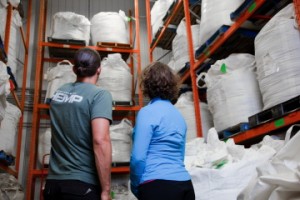
Whole hemp seed stored in bulk-sized tote bags awaiting quality control testing before being released for processing and packaging in the Manitoba Harvest plant’s production area.
“By taking steps to reduce our electricity usage, we also reduce our environmental impact by purchasing RECs,” says Greaves, “which is the equivalent of planting 1,009 mature trees and not driving an average car 438,464 kilometers (272,448 miles).”
Naturally, the lion’s share of all the product packaging used by Manitoba Harvest is made from recyclable and/or reusable materials, Greaves point out.
“We support sustainable agriculture by endorsing environmentally-friendly, non-intrusive farming practices,” says Greaves.
“We have a team that works closely with farmers, helping to educate them on hemp agronomy and encouraging more hemp acres to be grown.”
States Greaves: “When you choose Manitoba Harvest products, you can be assured that you are also making a choice for environmentally-conscious business practices.
“We are very proud of what we do at Manitoba Harvest,” he sums up, “and want our customers to feel good about supporting us as their business partner.
“We produce a darn good line of healthy hemp food products to which Canadian consumers are really starting to respond,” he concludes, “and that bodes really well for the future of our company and for the future of the hemp industry at large.”
Photos courtesy of Manitoba Harvest Hemp Foods.
Advertisement

